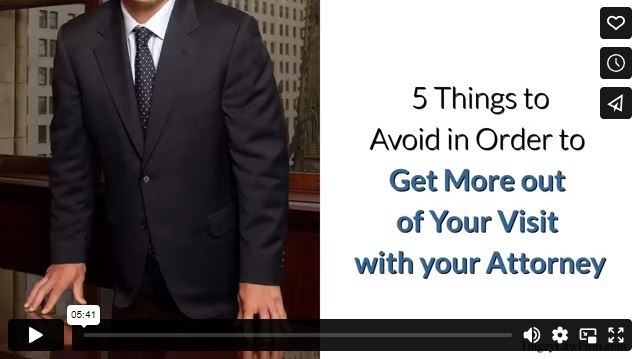1- Use Legalese
A grasp of legalese, a slang term for the formal and technical language of legal documents, is not necessary for a meeting with your lawyer. On the contrary, if you try to use it but are not well-versed in it, your legalese might sound pretentious or confusing. And it might also create the impression that you know more than you do. This could signal your lawyer to start shooting right back at you with a barrage of legalese. In essence, by getting in over your head with legal jargon, you could confuse your lawyer and yourself.

(advogadoaguilar / pixabay)
A good lawyer is trained and experienced in translating technical legal processes into lay language; that’s their job. Lawyers understand that they went to law school so their clients didn’t have to. A lawyer who can’t use plain, easily-understandable language is revealing their own ignorance or lack of training.
Instead of using legalese, focus on those things that you normally do to maintain a sense of self-respect: stay calm under pressure, avoid self-pity, speak honestly, be curious, keep an open mind. As Brené Brown puts it, “Don’t shrink, don’t puff up, stand your sacred ground.”
2- Show Up Late
We want to maximize our time with you, and we’ll want the full appointment time to do so. Arrive 10 minutes early. Have your phone turned off. If you are delayed or need to postpone the interview, call in advance.
If you are bringing children, prepare in advance for them to have a special activity to distract them or ask a friend to accompany you. Of course, as lawyers who are devoted to our families, we will understand unexpected situations, which children often present.
3- Forget Your Paperwork
We cannot claim to be mind readers or therapists. Our specialty is the law, and we can leverage the law in your favor when we have sufficient evidence. Here is what you need to bring, in some kind of written form:
- a timeline of relevant events with dates
- your injuries
- the expenses you have paid so far (medical bills, travel expenses, etc.)
- the income you have missed because of your injury (which days you have missed work, how much you would have earned in this time, vacation time or leave that you have been forced to use, income that other people may have missed in order to care for you, etc.)
- disability or insurance payments that you have collected so far
- the names and contact information for any other people and organizations involved (your employer, your insurance company/companies, your doctors, any witnesses, etc.)
- any other bills, photos, or documents that you think might be relevant
The more evidence you can give us, the better positioned we will be to get you the compensation that you deserve.
4- Talk A Lot
It’s common for people to chatter when they get nervous, but you can be more effective if you focus on speaking concisely and directly. Rather than oversharing, convey the basics, and let the lawyer ask for more information in areas where it might be needed.
Don’t feel pressure to burnish your image. You may worry that your attorney won’t take your case if you admit to partial responsibility or extenuating circumstances; however, the opposite is true. Admitting to your part of the problem will build trust with the attorney and help him or her know how best to advise you. Even if you bear partial responsibility, you may still have a very strong case.
During an initial interview, our attorneys will be assessing your case based on how you present it. Do you seem honest? Do you seem to tell a solid story or do you stumble over facts? Does your story match your paperwork, or do you contradict yourself? Are you complaining of an injury but presenting as perfectly healthy and fit? Do you seem like a credible witness, in case the lawsuit were to proceed to trial? Direct and candid speech is critical.
5- Shy Away from Questions
There’s a difference – a big difference – between talking too much and asking questions. An effective lawyer will welcome your questions and show a willingness to explain concepts in several ways.
It’s perfectly acceptable to ask for clarification, inquire about fees, ask what kinds of similar cases the attorney has taken, ask the attorney to define terms or slow down, ask for a copy of the attorney’s advice in writing, or anything else you need. If you leave the initial appointment feeling confused, feel free to call or email any follow-up questions afterward. Some clients like to bring along a friend or relative to help them capture and recall everything that was discussed. Other clients like to take notes during the initial consultation. Another tactic is to ask if the attorney can restate what has been said (“If I understand you correctly, you are saying that…”).
At Tingey Injury Law Firm, our experienced accident attorneys are here to guide you through the legal system and present your case in the most compelling way possible. We’re people, just like you, and believe in giving each client and prospective client the utmost respect. Take the important steps to prepare for attorney meetings, but don’t ever feel like you need to impress us or leave our office with questions. We’re here to be a support and advocate as you seek to recover physically, emotionally and financially after your injury accident.
Video

